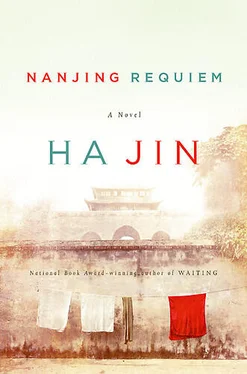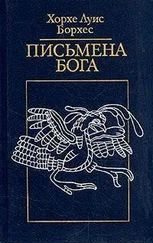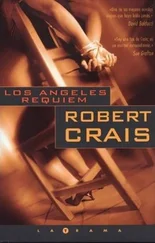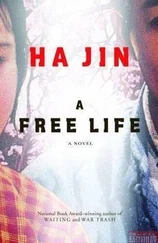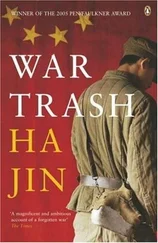To our surprise, Dr. Chu had met with Big Liu two days before and was familiar with the case. He was in his late thirties, with urbane manners. His three-piece suit was baggy on him, though his boots were shiny. He spoke while drumming his long fingers on the glass desktop as if tapping out a telegram. “I went to the Model Prison yesterday and chatted with an officer,” he told us in a low-timbred voice. “The man said that fifteen hundred prisoners were held there as forced labor. Many of them are civilians, and more than forty are young boys. But the officer wouldn’t let me speak to any of them. He feared that his Japanese superior might suspect him of leaking information.”
“Do you think there might be a way we can get some of them released?” Minnie asked. I was amazed that he was already involved.
“That’s possible. Try to get more women to participate and send the petition to Shanghai if the Japanese here ignore you. There must be a way to push them.”
“We’ll do that.”
“The prisoners are underfed and malnourished. Some were too ill to work. Maybe you should have some rice and salted vegetables delivered to those recognized by the petitioners.”
“So far only one boy was spotted by his mother,” I told him.
“I’m pretty sure more will be found.”
“We’ll try our best,” Minnie said.
“I’ll do everything I can to help.” He sighed, his eyes dimmed, and his patchy brows drooped.
Dr. Chu was one of the best doctors of Western medicine here, and even some Japanese officers had gone to him for treatment since he had come back to Nanjing a month before. With his help, we hoped that our petition might produce some results.
ONE AFTERNOON in mid-March, Minnie and I headed for the garden in the back of campus to look at the double daffodils that were about to unfold. She’d brought the bulbs back from America a decade before and Old Liao had helped to cultivate them. She was fond of flowers, particularly those that bloomed in fall and winter. Passing the small pond, we saw some goldfish, each about a foot long, lying belly-up in the water, and realized they must have been poisoned by soapsuds and night soil. A broken washboard was floating among them. Many women would scrub toilet buckets in the pond. In the beginning we had urged them not to do that, but so many people kept doing it that by now it had become a common practice. The refugees also laundered clothes and diapers in the water. There were three other ponds on campus — one behind the library, another near Ninghai Road and south of the Faculty Residence, and the third before the Practice Hall. But those three were much bigger than this one, and therefore not as polluted.
Although there were 3,328 refugees in the camp now, the 7,000 who were gone had left behind a good amount of garbage and waste. Feces were strewn in the grass and along some hedges, and a group of refugee girls had been collecting them with wicker baskets and small dung forks and piling them behind some buildings. As the weather was getting warmer day by day, the excrement had to be disposed of without further delay or an epidemic might break out. The girls had been digging pits to bury the waste they had collected, but we knew that even this was not a permanent solution. We needed lime, tons of it, to cover the feces and kill the germs, but to date we hadn’t been able to come by any.
“Phew, what a smell,” said Minnie.
“We’d better clean up this place soon,” I said.
“Yes, we must get hold of some lime.”
Without going farther west to see the daffodils, Minnie and I veered back toward the business manager’s office. She wanted to send Luhai to the Safety Zone Committee to ask Plumer, who had succeeded Rabe as its chairman, about the lime they had promised to help us procure.
Rulian turned up as we walked along. The second she saw us she said, “A girl killed herself.”
“Where?” Minnie asked.
“In the Central Building.” That was in Rulian’s charge now, because Holly had been hospitalized for tonsillitis and exhaustion. When I went to see Holly two days earlier, she had wanted to come back to Jinling, saying the hospital was too clamorous, but Dr. Wilson insisted that she stay there for another week. He knew she wouldn’t rest in bed once she returned to the camp.
Together Minnie, Rulian, and I headed for the Central Building. The fragrance of fruit blossoms made the air a little sweetish. Some refugees lazed around in the quad, where the two blind girls brought over by Cola, the young Russian, three months ago, and joined by another two blind ones, piped flutes and sawed away at the two-stringed erhus , learning to play snatches of the local Kun opera.
A crowd had gathered on the second floor of the Central Building. We entered a classroom that held more than sixty women. The room had a strong smell that brought to mind a chicken coop, but I was already accustomed to this odor. Rulian took us to the far end, which was shielded by a sky-blue screen. Minnie and I bent down to look at the dead girl closely — she was in her late teens, a tad homely but with soft skin and abundant hair. She looked pallid; her eyes were closed, her lips dark and parted, and through them I could see sticky blood in her mouth. Her round cheeks were grayish, but her expression was relaxed, as though she were about to yawn. Her short-fingered hand was resting on her chest, which seemed to be still heaving. Next to her clothes bundle, which served as a pillow, was an empty ratsbane bottle; she must have found it in one of the defunct kitchens. A frayed blanket covered the girl’s abdomen, but her legs stuck out, one foot wearing a scarlet woolen sock and the other bare. Although she looked familiar, I didn’t recognize her right away.
“Who is she?” Minnie asked.
“Her name is Wanju Yu,” Rulian answered.
At that, I remembered the girl, who’d been among the twelve taken by the Japanese on December 17, but I didn’t know how to tell Minnie about her in the presence of this crowd.
“Why did she do this to herself?” Minnie went on.
“I’ve no idea,” Rulian said.
“Any of you know why she took her life?” Minnie asked the women standing around.
They all shook their heads. A moment later one said the girl had cried a lot at night, and another added that she had often skipped meals, just sitting cross-legged in the corner like a statue and studying the floor. A thirtyish woman, suckling a baby in her arms, guessed that the dead girl must have been a student because she had often read a thick book alone and also crooned movie songs to herself. Since the first day these women had wondered if she had a cog loose.
I tugged at Minnie’s sleeve and said, “Let’s get out of here.”
We left the room, followed by Rulian. In the hallway I told Minnie, “The girl was pregnant and went to the infirmary a couple of days ago. She wanted an abortion. We told her we couldn’t do that for her because we had no doctor here. We should’ve given her more help, but we couldn’t kill a baby. The nurse and I really don’t know how to abort a fetus.”
“Who was the father of the baby?” Minnie asked.
“Some Japanese bastard.”
“I don’t get it. How did it happen?”
“Remember when the Japs grabbed twelve girls one evening last December?”
“Yes. And six of them came back the next morning.”
“Well, the dead girl was one of the six.”
“But they all said they were unharmed.”
“That’s just what they claimed. How could they admit they’d been raped? How could any of them find a husband if they were known as having been violated by the Eastern devils? Neither they nor their families could bear the shame.”
Stunned, Minnie swayed a little. She put her hand on Rulian’s shoulder, sputtering to me, “Why didn’t you breathe a word about this? Those girls should at least have received medical attention.”
Читать дальше
